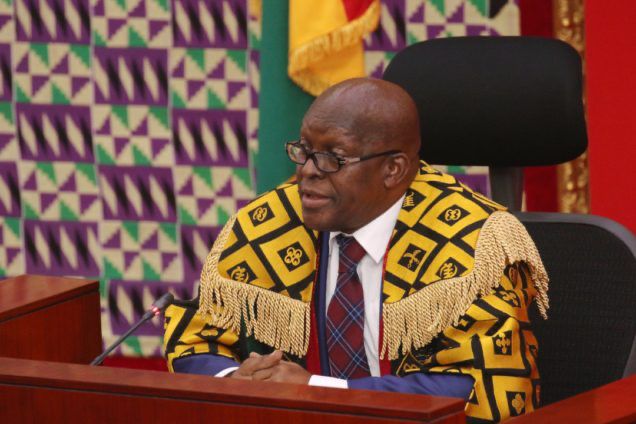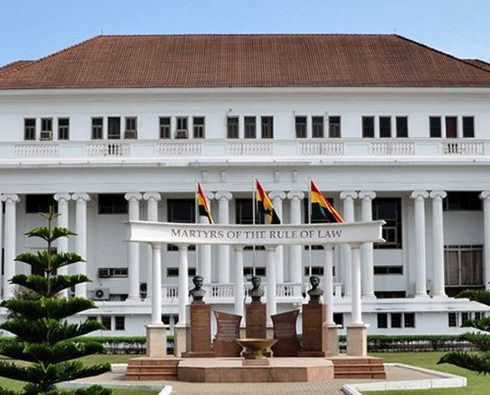When the Speaker is not a Speaker
ABSTRACT
The purpose of this brief is to weigh the freedom of expression[4] of Ghana’s Speaker of Parliament against the requirements of his office as an umpire for the heated debates seen in the country’s legislative chamber.[5] The question sparked the writer’s interest when the Speaker of Parliament Alban Bagbin declared support for a Bill laid before the House. The writer observes from the multiple sources available and guides readers to the conclusion that the framers of the law intended for Rt. Hon. Bagbin, his predecessors and successors to stay away from the politics of the debates in the House and focus on overseeing the said debates. The essay, in part, relies on the historical development of the Office of the presiding member of Ghana’s legislature and the current position of the law found in the texts. Also in the literature are comparisons between Ghana’s Speaker and those of other democracies to examine their respective roles. The question is also asked of the similarities in the role of Ghana’s Speaker of Parliament and the role of judges. Are their roles at all similar? If so, should the same standards which are expected of judges, vis-à-vis commenting on issues that can end up in their courts be imposed on the Speaker of Parliament?
INTRODUCTION
When a contentious Bill was laid before the House[6] by a bipartisan coalition[7] of legislators led by Ningo-Prampram Member of Parliament Sam George[8] to criminalise sexual relations between same sex people and to criminalise advocating for the rights of gay people, pressure mounted on politicians—elected officials, especially, to state where they stood.[9] Traditional and religious leaders who represented a good number, dare to say majority of the Ghanaian people, asked elected leaders to back the Bill or face their wrath in the next election cycle.
The Bill itself had divided opinions across the country and beyond Ghana’s borders. International media outlets tagged the Bill as the most draconian anti-LGBTQ regime ever proposed.[10] Civil society groups back home decried the bill as barbaric and backward—they rallied[11] to fight its passage.
Meanwhile, the religious and traditional leaders also assembled to present arguments on why the Bill must see the light of day and quickly so. Rt. Hon. Bagbin felt the heat, let caution slide and made his biases known[12]—throwing full support to the Bill’s passage; a process for which he is an umpire. Some MPs, especially from the New Patriotic Party (NPP)[13] took him on, calling out his bias[14]. The cries fell on deaf ears and we are where we are. At the time of writing and publishing this article, the Bill was yet to be passed but was in Parliament, going through the various processes[15] prescribed by the Constitution, 1992.
In the subsequent paragraphs which deal with the substantive points of this essay, the writer resists the temptation to enter the contents of the Bill or the politics of the LGBTQ debate—whether or not Ghana should legislate to criminalise gay activities or advocating for rights of gay people. The argument of this brief is steered only on the question of whether the Right Hon. Speaker should have declared support for the Bill and even promised to have it passed within a short period. Can he or should he do that in exercise of his freedom of expression or has he lost the moral right to serve as an umpire for the debates on the LGBTQ Bill when it leaves the Committee stage and gets to the plenary for debates?
***
The Speaker of Parliament
The office of the Speaker of Parliament is established by Article 95 of the 1992 Constitution.[16] A person elected as Speaker of Parliament cannot hold on to their seat if they were a Member of Parliament prior to their elevation as Speaker.[17] The Constitution further denies the Speaker of voting rights in Parliament under Article 104.[18]
Important notes at this point is that the Speaker can be elected from among members of the House or outside of the House, the only requirement being that whoever is elected must be qualified[19] to be elected as a member of the House. However, the two Deputy Speakers provided for in the Constitution, must be elected from among members of the House and retain their seat, notwithstanding their elevation. The 1957 to the 1979 Constitution specifically mention that a presiding Deputy Speaker has an original but no casting vote. No mention is, however made of voting rights of a presiding Deputy Speaker in the 1992 Constitution which may suggest an intention on the part of the framers to exclude the right. The conclusion of the Supreme Court in the recent Justice Abdulai case[20] says different, but that is not today’s topic.
A reading of the Parliament Act, 1965 (Act 300) shows that the First (1st) Republic law gave birth to the provisions in the 1992 Fourth (4th) Republican Constitution. In fact, there are no contradictions or changes to these provisions in Act 300 to the provisions under Article 95 of the 1992 Constitution.
Act 300, like the Constitution, emphasizes the Speaker’s major role—to preside over sittings of Parliament.
The Standing Orders of Parliament rightly follow the provisions of the Constitution on election of the Speaker.
The primary duty of the Speaker of Parliament extracted from these three sources is to preside over sittings of the House; to serve as an umpire as the elected representatives go at one another, so to speak. Such a role is critical in a chamber where there is no outright or comfortable majority as has been witnessed in the 7th Parliament.[21]
Besides the instance under scrutiny in this composition and the usual foul cries[22] from the NPP side of the House, one would not be wrong by stating that the Rt. Hon. Speaker Bagbin has discharged his duties with utmost honour.
A LOOK INTO OTHER JURISDICTIONS
Speaker of the US House of Representatives
In fact, had the Rt. Hon. Bagbin been serving his time in the United States of America, nobody need blink an eye over his support for a Bill coming before the House.
Speaker Pelosi is a Democratic representative. In fact, she would not have been elected to serve as Speaker of the US House unless she is an elected member; as tradition has shown.[23] More so, she retains her seat during her tenure as Speaker and in fact, loses the chair if she does lose her Congressional District.[24]
The sharp contrast between the Speaker of the US House and her Ghanaian counterpart is evident at this point. While one of them retains her political identity and by extension her biases, the other is waned off his prior political identity by virtue of the elevation to Speaker.
The Speaker of the US House is in fact a de facto leader of the majority party in the House. She is expected, thus, to push the agenda of the Democratic President Joe Biden as she opposed and did fight Donald Trump, a Republican in all his Bills, even to the extent of tearing up the 45th President’s State of the Union Address on live TV.[25]
Speaker of the UK Commons
The UK Speaker of Commons is similar to his Ghanaian counterpart; and unlike that of the new world mentioned above, all Westminster-styled legislatures follow the pattern.
When the Speaker of Commons is elected, he swears to permanently cast aside his previous political views[26], asserting his role as an umpire instead of the leader of one side of the House.
Although the Speaker of Ghana’s House does not speak such express texts, he, like the Speaker of Commons, cuts off ties with his party by giving up his seat, and any positions in the party, giving credence and a high persuasive effect that he is not expected to declare party or positional biases on contents of Bills brought to the House for debate.
Freedom of Expression of the Ghanaian Speaker
Where then lies the Speaker’s freedom of expression? Do we simply curtail such a fundamental right by virtue of his elevation?
The answer is brief, in fact, and lies in the standards to which judicial offices are held.
Judges
Judges, per tradition are not permitted to display their personal biases on matters that could end up in their courts—when they do they must sit out the matter when it does come to the courts for determination.
On the above point, Ekow Daniels[27] writes in When a Judge is not a Judge[28], that “…the other traditional form of bias or interest which disqualifies an adjudicator from acting is known as personal bias which is being used in this context to include personal views on the subject-matter.” [Emphasis mine].
“To justify an allegation of interest or bias against a judicial officer, it must be established that he in fact has some interest in the subject-matter…as to make it impossible for him to adjudicate upon the matter with an independent mind, and without any inclination or bias towards one side or the other in the dispute.”
The above extracts from Daniels’ classic on the subject of Nemo Judex in Causa Sua lay the foundation that persons playing a referee between two adverse positions must not make their biases, if any, known. Such a declaration by the referee defeats the entire process, reason the maxim exists.
The Nemo Judex Rule is, however, a check on the Judiciary.
Be that as it may, the principle can be used to check either of the two organs of government if they are in a position to exercise adjudicative or referee roles, as Ruth Bader Ginsburg discusses.
Ginsburg, (1933-2020) a former Justice of the Supreme Court of the United States placed the same duty on Senator Mitch McConnell[29] in the matter of Trump’s impeachment.
Trump was expected to face senators—who would determine whether the President continued to stay in office or became only the first US President to be hauled out by the lawmakers.
McConnell suggested to the media that the hearing was just a formality and the president’s acquittal was a foregone conclusion,[30] the Republicans were controlling the Senate then.
Ginsburg, denouncing McConnell’s remarks, said senators who displayed bias should be disqualified from sitting to hear the Trump case. When asked about senators making up their minds before the trial, the Supreme Court Justice said: “Well if a judge said that, a judge would be disqualified from sitting on the case.[31]”
If a member of the chamber who is serving briefly as a juror should be disqualified from sitting to hear a matter for overt display of bias, what standards should a Speaker of Parliament be held to when he slays his office on the altar of populism to display support for a Bill which has so clearly, divided public opinion?
The standard placed on judges can be and is in fact be expected from the legislative body if MPs—or in the instant case, the Speaker—are acting in an adjudicative capacity.
HISTORY OF THE OFFICE
A holistic appreciation of the role that the Speaker of Parliament plays under the 4th Republic and the courtesy expected of him can and should, if need be, be ascertained from the history of the office’s creation.
Ghana’s legislature traces its ancestry to the 1850 ordinance which created a Legislative Council for the administration of the Gold Coast. The territory would later be administered from Sierra Leone before being returned to the status of an independent colony with its Executive Council restored.
During this time, the Governor constituted the Legislative Assembly and presided over its sittings, a Speaker—one would say.
Subsequent constitutions for the Gold Coast made gradual steps toward accommodating demands for inclusive governance,[32] the 1916 Clifford Constitution, the Guggisberg Constitution of 1925 and the 1946 Burns Constitution being some notable ones.
Despite being touted for introducing the elective principle into the colony’s politics, the Guggisberg Constitution still fell short on many grounds—the significant point here is its retention of veto powers of the Governor who presided over sittings of the Legislative Assembly. The governor also had a casting vote.
The casting vote was extended to the presidents of the town councils.[33]
The revolution of the legislature came with the birth of the 1951 Constitution. The office of the Speaker was created with the primary duty of its holder being to preside over parliamentary deliberations. This duty was carried on to the 1954 Constitution.
The casting vote, and veto powers were retained, not by the Speaker who took over presiding duties from the governor but the governor himself, so that whenever there was a deadlock in decision, the Governor cast a final vote.[34]
This changed when the 1957 Independence Constitution was promulgated. Article 40 of the Constitution provided that when there was a tie on a matter before the Assembly, the motion would be deemed lost—scrapping the Governor’s century and seven casting vote. The Speaker had no original vote which has lived to this day.
The odyssey of the Speaker’s office reveals a gradual yet overt atrophy of his ability to express opinions on matters that are or set to become subject of the law making process. He has but one duty, to preside and keep members of the House in check.
Other Speakers since 1992
Has any other Speaker of Parliament under the Fourth Republic been caught in the same situation as Rt. Hon. Bagbin? A situation where they are forced to make overt declarations on their stance on Bills which appear before them? In my experience, no. Why?
The 7th Parliament is unique in a number of ways; one of them being that the Speaker hitherto his elevation, was an active member of the opposition party in and outside Parliament. It is also a hung Parliament which means the government cannot bulldoze its way through as previous administrations have done—having enjoyed the comfort of a Parliament in which their party had an outright majority.
As a result, in past governments, the Executive was assured and did enjoy the Speaker’s support, whether they solicited it or not because they came from the same party. Now, however, government spokespersons in the media have even accused the Speaker of frustrating government business because he allows keen scrutiny of documents brought to the legislature for approval, claims he’s had to fight off.[35] Rt. Hon. Bagbin has found himself showing open support for the so-called anti-LGBTQ Bill because all but one of the sponsors are from the NDC not the Executive which usually sponsors Bills through the House.
Besides, significant figures in the NPP who are close advisors of President Akufo-Addo have displayed their bias against the Bill, citing its onerous provisions[36]. This has created the impression that the vote would go down to the wire. The Speaker, therefore, finds himself as an umpire for a Bill that has divided the nation and which has focused the world’s lenses on Ghana. Parliament is itself heavily divided with senior members of the House expressing serious reservations about the Bill. A combination of all these and other issues tipped Rt. Hon. Bagbin over, making him act as a member rather than the Speaker of the House.
CONCLUSION
The final say on whether or not a Bill passes the House, does not lie in the Speaker’s bosom per se, so his bias does not necessarily carry the potency a judge’s bias would wield—which caused the formulation of the principle of Nemo Judex in Causa Sua.
This notwithstanding, what happens when such referees possess and do disclose their bias is manipulation of the game.[37] Machinations are put in place to then whip legislators to toe the popular will instead of express theirs or risk its consequences. This was put to the Speaker by Akoto Ampaw, Esq. in reaction to the former’s ruling that voting on the LGBTQ Bill will be public where the public knows how each MP voted instead of the usual voice vote.[38] Mr. Ampaw observed (which I concur) that the intent is to force MPs to vote a particular way or risk being annihilated in the next election cycle—Who determines such voting means? The Speaker.
If the Speaker can therefore determine a means of voting which has tendency to influence the vote cast, how closer could he be from unduly influencing the decision of the House by subterfuge means? Is he in violation of Articles 23 and 296 which regulate discretionary powers?
In close calls, it rests with the Speaker to determine which shout is the loudest, the ayes or the nays. Parliament becomes a laughing stock because a Speaker says “the ayes have it”[39] when clearly, the whole world sees and hears that the nays are more, and consequently, louder, just another instance where a Speakers bias affects the decision of the House. Such spectacles dismantle the notion that the Speaker is merely seating to announce decisions instead of acting in an adjudicative capacity, because a Speaker does in fact exercise adjudicative powers.[40]
Valid suspicions are raised[41]–[42] about the motive for exercising presiding powers and the entire legislative process is subjected to populism and unwarranted attack—all because one person elevates personal bias on a vexed topic above the status bestowed on him as the third gentleman of the land.
Alban Bagbin is probably the best and most qualified person to serve as Speaker of the 7th Parliament—at the very least, he is the more qualified of the two persons who ran for the position, being the longest serving MP hitherto his election as Speaker; a record which also gave him the chance to serve in all other leadership positions in the House, a record his opponent in the 2021 Speakership race, Prof. Mike Oquaye could not boast of. However, that qualification does not put him beyond gaffes, which he unfortunately made when he disclosed biases on the anti-LGBTQ debate.
Today, it is LGBTQ which is agreeably unpopular in our cultural setting and therefore, his bias was let slide by the many. But tomorrow is uncertain!
***
POSTSCRIPT
(Inspired by my brothers, Kabu Nartey & Frederick Agaaya)
Firstly, the question arises whether the proposition in this brief piece should apply to any of the Deputy Speakers who finds himself presiding over the House. My answer to this is in two-fold and I take inspiration from Rt. Hon. Bagbin to arrive at my conclusions.
In the aftermath of the rejection of the 2022 budget and financial statement and the reversal of that decision by the 1st Deputy Speaker of Parliament Joe Osei-Owusu, Bagbin delivered an insightful analysis on the issue of quorate numbers and the right of a Deputy Speaker to vote.[43]
The first instance he pointed to is where the Speaker is temporarily absent from the chamber and a Deputy Speaker has to preside. Here, Bagbin observes that our jurisprudential formation allows for the Deputy in this instance to enjoy all his rights in relation to forming a quorum and voting.
The contentious part is where the Speaker is unavoidably absent—say out of the jurisdiction and the Deputy has to take charge. Quoting Bagbin with approval, I say: “the Speaker’s unavoidable absence from the precincts of Parliament means the First Deputy Speaker assumes the authority of the Speaker and performs all the duties of the Speaker in relation to the Chamber. In this role, the First Deputy Speaker takes on the cloak of an Acting Speaker and for the purposes of our rules and the Constitution assumes all the powers of the Speaker in relation to the business of the House…and thus all rules and limitations applied to him in a manner that applies to the substantive Speaker of Parliament.”[44]
Secondly, this brief stirred up debates which raise multiple questions about the onus on other heads of institutions and the sort of influence their opinions hold and whether they can separate their person from their official capacity while declaring theses biases on vexed issues. Could the Rt. Hon. Speaker have argue that his overt display of support is inconsequential? Or could other heads of institutions issues caveats when they weigh in on such topics.
As a journalist, I have written one too many stories attributing them to an institution because the head of the institution was interviewed and offered those opinions on my media platform, only for the individuals (probably after feeling the backlash) to return and say they were speaking in a personal capacity and not representing the views of their institution. (They introduced themselves as head of the institution for the purposes of the interview nonetheless).
Also, President Akufo-Addo has repeatedly said gay marriages would never be legalized under his administration. A bold statement, it sends a message probably most Ghanaians want to hear. But have you taken time to assess its legality?
What would happen if a private member’s bill is sponsored for the legalization of gay marriages and it does pass the House? The provisions of the Constitution, 1992, would compel the President to assent to such a Bill if it meets the threshold set by the Constitution. What then becomes of Akufo-Addo’s vow? Would he resign in order to avoid signing Bill as required or risk contempt of Parliament ad dereliction of duty?
So the question then is also asked if the President should have made those declarations. Questions which need answers.
***
—END—
APPRECIATION
To my brother and fellow revolutionary Kabu Nartey whose appreciation of governance issues never cease to flabbergast me, who though outside of the jurisdiction on important business, took the time to read, offer critiques and suggestions and a foreword, I say thank you. My gratitude also goes to Benjamin Alpha Aidoo, whose review helped me to fine-tune the structure of this piece. And to my editors who always come through for me anytime I call, Kingsley Adum, Bubune Mansa Sedanu-Kwawu, Ekow Andoh, Fafali Alai, Hassan Timtooni, Jalil Issah, Nii Ayitey Komey and Charles Okyere, I appreciate all your comments and reviews, without which this piece could not meet the standard expected. To Veronica Gwira who helped me with my research despite receiving no prior notice at all and then helping me to edit the work, I am very grateful. And then to Frederick Agaaya and Basit Fuseini, ESQ who put the last knots in place to tie the loose ends, thank you for your insights and then I thank Almighty God for His inspiration for we are but tools for His will.
When the Speaker is not a speaker[1].
The question of impartiality of Ghana’s Speaker of Parliament & Bagbin’s dance with the LGBTQ Bill[2].
Oswald Azumah[3]
CLICK HERE TO DOWNLOAD THE PAPER
[1] The title, When the Speaker is not a Speaker is an adaptation of Ekow Daniels’ When a judge is not a judgewhere he discusses the principle of Natural Justice –Nemo Judex In Causa Sua
[2] The full title of the bill is Promotion of Proper Human Sexual Rights and Ghanaian Family Values Bill – for Bill to protect Ghanaian Family values, its silence on adultery is loud.
[3] The author—Oswald Azumah is a journalist and Political Analyst & freelance writer. He is a child rights activist and a 2018 NSPCC Fellow.
[4] Article 21 (1) (a) of the 1992 Constitution guarantees freedom of expression to all manner of persons in the Republic of Ghana.
[5] Ghana operates a unicameral legislature which is largely fashioned along Westminster style—with lots of similarities between the Ghanaian House and the UK House of Commons.
[6] The House of Parliament—here and afterward referred to as the House.
[7] The other MPs are: Emmanuel Bedzrah (MP, Ho West) Della Adjoa Sowah (MP, Kpando), John Ntim Fordjour (MP, Assin South), Alhassan Sayibu Suhuyini (MP, Tamale North), Helen Adjoa Ntoso (MP, Krachi West), Rita Naa Odoley Sowah (MP, La Dadekotopon) and Rockson Nelson Dafeamekpor (MP, South Dayi).
[8] Sam Nartey George is an outspoken member of the opposition National Democratic Congress (NDC) and is a second term Member of Parliament for Ningo-Prampram in the Greater Accra Region.
[9] BBC, Ghana church leaders intensify pressure on parliament to pass anti-gay bill. https://www.bbc.com/pidgin/tori-58867937
[10] Ghana Poised to Vote on Worst Anti-LGBTQ Ever, Advocates Warn. https://www.nbcnews.com/nbc-out/out-news/ghana-poised-vote-worst-anti-lgbtq-bill-ever-advocates-warn-rcna1545
[11] A coalition of Civil Society Organisations are actively working to discourage MPs from supporting the bill, arguing human right concerns. The CSOs have held seminars to put their concerns with the Bill across. They have also made submissions to Parliaments Legal Affairs Committee which is currently considering the Bill—including memos from the public.
[12] “LGBTQ is worse than Covid-19. We will outlaw it by end of year 2021” – Bagbin. https://citinewsroom.com/2021/06/lgbtqi-worse-than-covid-19-well-pass-law-criminalising-it-by-end-of-2021-bagbin/
[13] The New Patriotic Party (NPP) +1 one Independent MP form the majority in the House. The IND MP—Andrew Asiamah is a member of the party but fell out with the party’s leadership in his home Constituency and run as an Independent Candidate as a result. He won a landslide victory.
[14] NPP MP fights Speaker Alban Bagbin over LGBTQ Bill. https://www.pulse.com.gh/news/local/npp-mp-fights-alban-bagbin-over-anti-lgbtq-bill/v4m6wyc
[15] The Bill is being considered under Article 106 of the 1992 Constitution.
[16] Article 95: There shall be a Speaker of Parliament who shall be elected by members of Parliament from among persons who are members of Parliament or who are qualified to be elected as Members of Parliament.
See: Article 95 (3)
[17] Article 97 (b)
[18] In Article 104 (2) the law says the Speaker shall have neither a casting nor an original vote. This is key.
[19] Article 94 of the Constitution spells out the qualifications for MPs
[20] Justice Abdulai v. Attorney-General (J1 7 of 2022) [2022] GHASC 1
[21] The 7th Parliament of the 4th Republic is a hung parliament with all parties failing to secure an outright majority. It has led to the Speaker of Parliament being elected from a different party than the winners of the Presidential elections for the first time since 1992. (NDC&NPP- 137 while Ind. – 1)
[22] The NPP MPs in usual fashion accuse the Speaker of acting on partisan lines instead of as a neutral and objective head of the House.
[23] There is no law banning the election of persons who are not members of the US House from being elected as Speaker. However, only members of the House have won the race with the leader of each party’s caucus running for the position. https://sgp.fas.org/crs/misc/RL30857.pdf
[24] As the party selects its leader in the House to the Speakership position, precedent has shown that they are unlikely to retain the Speaker if she loses her congressional seat, even if the party retains majority in the House.
[25] Nancy Pelosi tears up Trump’s State of the Union speech in possible 2020 tipping point https://www.nbcnews.com/think/opinion/nancy-pelosi-tears-trump-s-state-union-speech-possible-2020-ncna1130776
[26]BBC. (2009) Tory MP Bercow is elected Speaker. http://news.bbc.co.uk/2/hi/uk_news/politics/8111887.stm
[27] Ekow Daniels
[28] When a judge is not a judge: present trends [December 1970] vol. Ii no. 3 RGL 192—206
[29] Mitch McConnell was the majority leader (Rep) in Senate. After the 2020 General Elections, he was retained as leader but this time as Minority Leader as the Republican lost control of the upper chamber.
[30] McConnell’s ruthless campaign to bring about a speedy trial and a forgone conclusion left Democrats with little but the hope voters would notice in the 2020 election. https://www.businessinsider.com/mitch-mcconnell-politics-trump-impeachment-trial-2020-2?r=US&IR=T
[31] “A Judge Would Be Disqualified”: Justice Ginsburg Again Wades Into Political Controversies In Interview. https://jonathanturley.org/2019/12/18/a-judge-would-be-disqualified-justice-ginsburg-again-wades-into-political-controversies-in-speech/
[32] The nationalist movement, the chiefs and the intelligentsia demanded for an inclusive governance (i.e.) more Africans in the Executive and Legislative councils. Eventually the demand took a fierce turn toward the demand for Independence with Kwame Nkrumah leading the charge for a self-government now, against the UGCC’s mundane self-government within the shortest possible time.
[33] Benion, F. (1962) Constitutional Law of Ghana, the Republican Constitution. Doc. No. 1962.001.003 Butterworths, 1962
[34] Abiola Ola; A Textbook of West African History; 3rd edition; Ado-Ekiti; Omolayo Standard Press & Bookshops Co. (Nig.) Ltd.; 1984
[35] ‘I won’t frustrate government business or be an errand boy for the Executive’ – Bagbin tells critics. https://www.ghanaweb.com/GhanaHomePage/NewsArchive/I-won-t-frustrate-government-business-or-be-an-errand-boy-for-the-Executive-Bagbin-tells-critics-1425841
[36] ‘I’m against anti-LGBTQI Bill and not shy about it’ – Gabby Otchere-Darko
[37] The fracas of the passage of the controversial E-Levy is enough proof of how a bias umpire can manipulate the law making process. After its initial rejection, the Deputy Speaker—Joe Owusu—who is NPP led a one-sided chamber (after the NDC members boycotted sitting) to overturn Bagbin’s ruling on the matter—which also led to a controversial Supreme Court decision. Nobody wants such spectacles anymore; the reason the Speaker must display utmost objectivity while steering the affairs of the House. More display of bias towards Bills which are laid before the House can only lead to more of the E-Levy disturbances we saw on live TV.
[38] Your ruling was unrelated to legislative procedure – Akoto Ampaw to Bagbin https://www.myjoyonline.com/anti-lgbtq-bill-your-ruling-was-unrelated-to-legislative-procedure-akoto-ampaw-to-bagbin/
[39] Second Deputy Speaker of Parliament Andrew Asiamah (MP, Fomena) ruled in one instance in favour of the ayes where video and audio evidence showed the nays had it. The outcry from viewers exposed his bias. Video in link.https://twitter.com/LydiaSpio/status/1577021893760409600?t=Pcy_PVd2shP6y4JJ2lj4qg&s=08
[40] Shri Kihota Hollohon v. Mr. Zachilhu & others AIR 1993 SC 412, JT 1992 (1)
[41] 3News. Akoto Ampaw tackles Bagbin for saying voting on anti-gay bill will be public. https://www.ghanaweb.com/GhanaHomePage/NewsArchive/Akoto-Ampaw-tackles-Bagbin-for-saying-voting-on-anti-gay-bill-will-be-public-1389769
[42] Bright Simons. https://twitter.com/BBSimons/status/1502983064842088456
[43] Full Text: Bagbin speaks on Quorum, Deputy Speaker and 2022 Budget. https://www.adomonline.com/full-text-bagbin-speaks-on-quorum-deputy-speaker-and-2022-budget/
[44] Ibid
Read also: THE UNSUNG VALUE OF ESCALATING COUPS ON A FAILING CONTINENT: The politician vs the soldier
Source - Oswald Azumah








1 Comment
Veronica Gwira
3 years agoTo say the piece is good is an understatement.This is a must read for all law students and lovers of politics.